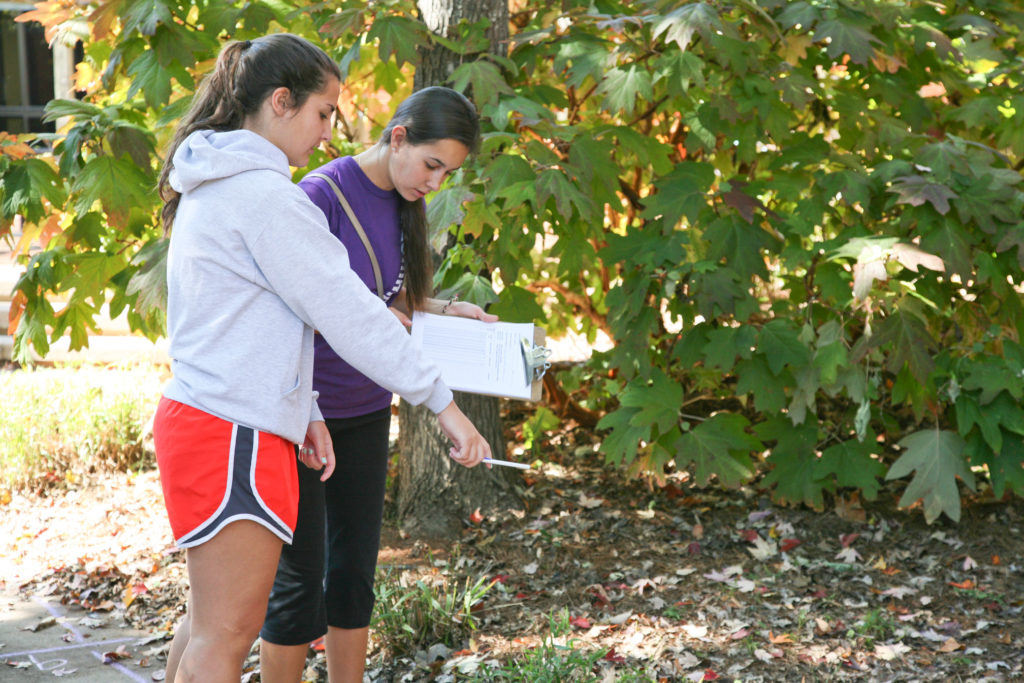“Distance: 10 meters. Species: spider. Color: orange. Cover: light,” said Ashley Hobbs as she paced slowly through the Odum School of Ecology courtyard, intently scanning the ground, shrubs and trees along the way.
Beside her, Sam Sanders logs the information on a datasheet. The students are conducting a “wildlife” survey—in this case the wildlife consist of tiny plastic Halloween decorations—as part of their First-Year Odyssey seminar, “Great Ape Behavior and Conservation.”
The course, taught by Sonia Altizer, an associate professor in the ecology school, is an interactive seminar that explores the world of great apes. Jena Hickey and Julie Rushmore, Ph.D. students who conduct field research on great apes in Africa, are collaborating with Altizer in developing and teaching the class. Through lectures, class discussions, multimedia presentations and mini projects—field exercises like the “wildlife” survey—students learn about apes and their habitats as well as the science of behavioral and conservation research.
“We want to help provide students a full sensory experience, to not only teach them about a subject we care deeply about, but to virtually take them there—‘there’ being the rainforests of Africa, Indonesia and Malaysia,” said Hickey.
Before each class the instructors show videos or photos they’ve taken while on research trips, accompanied by African music. To their surprise, most of the students arrive early each week so they won’t miss these presentations.
“Every time they tell stories about observing apes and meeting the indigenous peoples, I always think about how traveling to foreign places and studying abroad is exactly what I want to do later on in life,” said Leila Marion, who plans to become a wildlife biologist.
“My favorite part of the class is doing the mini projects,” said Spencer Davis, who is considering a major in biology. “We’ve gone outside, observed animals and done a wildlife survey. It’s really interesting to see how much is involved in conservation. You can’t just go into a country and say, ‘You should protect these animals!’ I’ve learned there’s a lot more to it than that.”
Amanda Mondock, who plans to major in furnishings and interiors in the College of Family and Consumer Sciences, likes the class discussions.
“Some of the things I’ve learned about chimpanzees and other animals have surprised me,” she said. “We’ve talked about issues like the illegal pet trade and bush meat—I didn’t realize how big that was. The class has been an eye opener. It’s a lot of work, but I look forward to going to it every week.”
Students also appreciate the small class size.
“My FYOS class is by far my smallest class, which motivates me to become more involved in the discussions and activities,” said Katie Davis, who had intended to double major in history and English, but is now considering biology.
Altizer, for her part, is impressed with the students and enthusiastic about the First-Year Odyssey program.
“I’m very pleased with how engaged and insightful the students in the class are,” she said. “Their comments and questions show that they are digging into the material and coming up with some great ideas. This class has been a fun experience for us all, and I love the idea of getting incoming students interacting with faculty and researchers in a small group setting right from their first days on campus.”
“It is an amazing class and I would recommend it to any incoming freshman,” said Marion. “You really not only learn about apes but about different countries and cultures. It is like a study-abroad experience in a classroom.”
